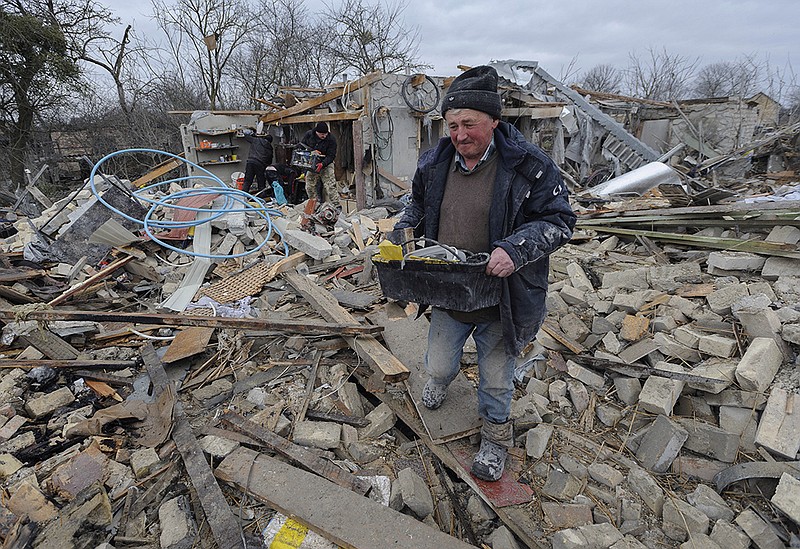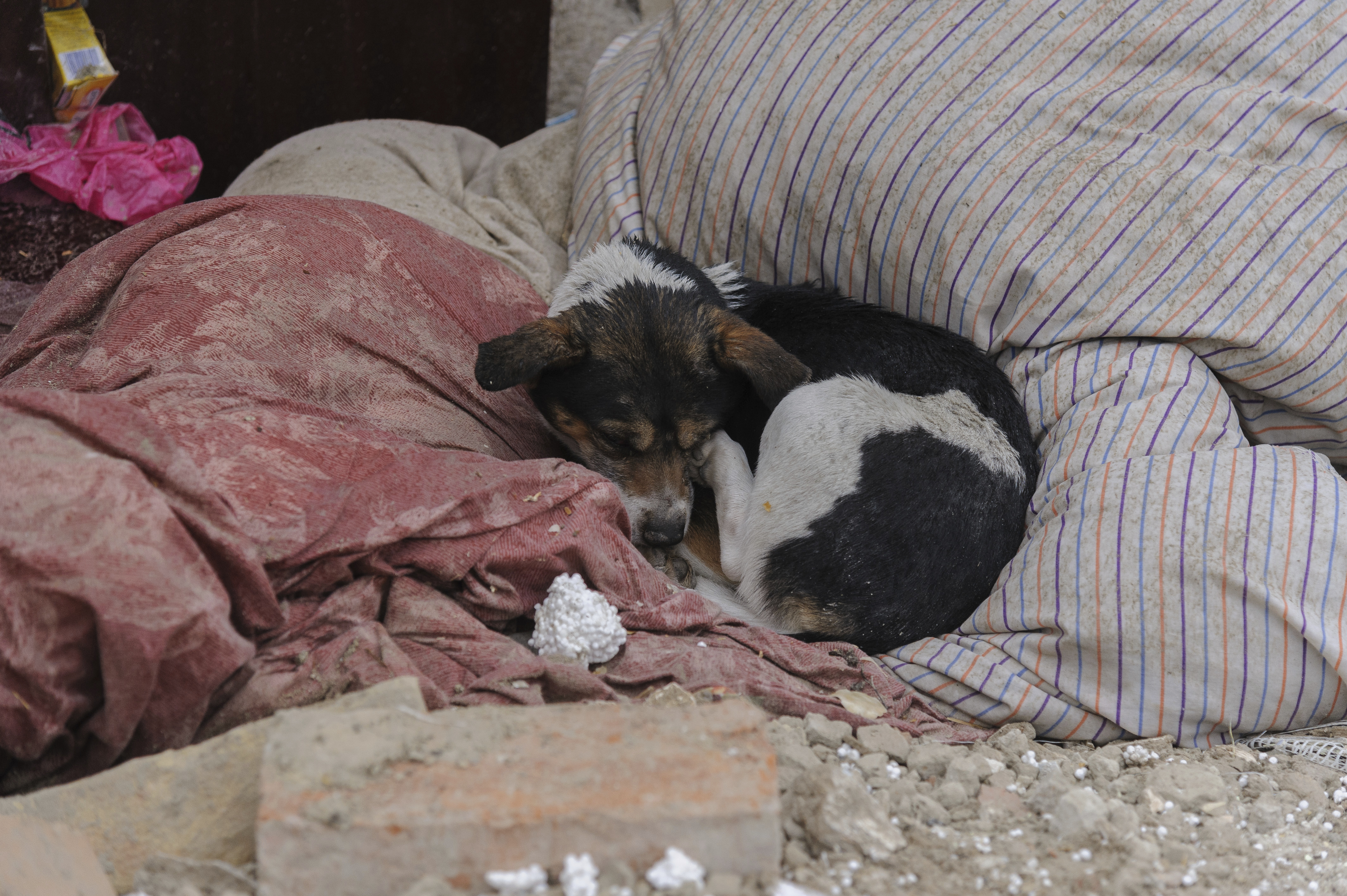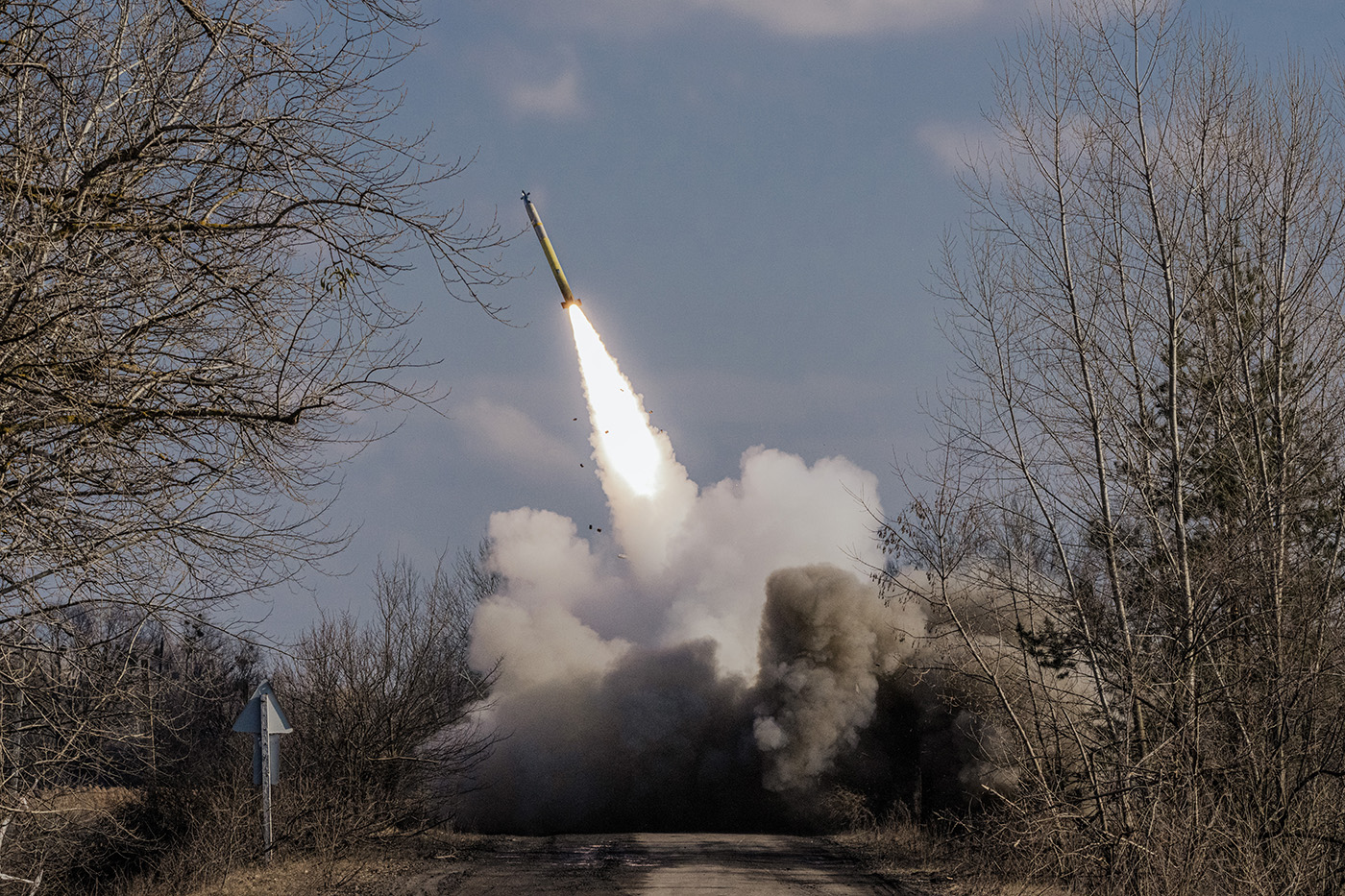KYIV, Ukraine -- A barrage of more than 80 Russian missiles and a smaller number of exploding drones hit residential buildings and critical infrastructure across Ukraine on Thursday, killing six people and leaving hundreds of thousands without heat or electricity.
The strikes included six of the new hypersonic missiles known as Kinzhals, or Daggers. That is the most Russia has used in a single wave since the war began a year ago, according to Ukraine's air force. Overall, Russia fired nine types of cruise and ballistic missiles alongside a volley of eight Iranian-made exploding drones.
The largest such attack in three weeks also put Europe's largest nuclear plant at risk by knocking it off the power grid for nearly half of the day before it was reconnected. Because nuclear reactors need constant power to run cooling systems to avoid a meltdown, the latest power loss at the Zaporizhzhia plant again raised the specter of a nuclear catastrophe.
Air raid sirens wailed through the night as the attacks targeted a wide swath of the country, including western Ukraine, which is far from the front lines. President Volodymyr Zelenskyy said the assault that came while many people slept was "another attempt by the terrorist state to wage war against civilization."
The Russian Defense Ministry said the strikes were in retaliation for a recent incursion into the Bryansk region of western Russia by what Moscow claimed were Ukrainian saboteurs. Ukraine denied the claim and warned that Moscow could use the allegations to justify stepping up its own assaults.
The Kremlin's forces started targeting Ukraine's power supply last October in an apparent attempt to demoralize the civilian population and compel Kyiv to negotiate peace on Moscow's terms. The attacks later became less frequent, and analysts speculated that Russia may have been running low on ammunition. The last major bombardment was Feb. 16.
The head of the U.N. nuclear watchdog agency said the Russia-controlled Zaporizhzhia nuclear plant lost all external power for 11 hours after its last remaining power line was disconnected following reports of the missile strikes. Rafael Grossi of the International Atomic Energy Agency emphasized that the incident "again demonstrated how fragile and dangerous the situation is" for the plant.
Overall, Russia launched 81 missiles and eight exploding Iranian-made Shahed drones Thursday, according to Ukraine's chief commander of the armed forces, Valerii Zaluzhnyi. Thirty-four missiles were intercepted, as were four drones, he said. The mixture of munitions makes it harder for air defenses to cope with the onslaught, military analysts say.
The Russian Defense Ministry said the barrage hit military and industrial targets in Ukraine "as well as the energy facilities that supply them."
The missile strikes took no toll on the army's combat capability, but they played "on the nerves of the civilian population of Ukraine," Ukrainian military analyst Oleh Zhdanov told The Associated Press.
In his evening video address to the nation, Zelenskyy struck a defiant tone.
"We have already shown what Ukraine is capable of," he said. "And no matter how treacherous Russia's actions are, our state and people will not be in chains. Neither missiles nor Russian atrocities will help them."
Nearly half of households in Kyiv were without heat, as were many in Kharkiv, Ukraine's second-largest city, where the water was also cut on a day when outdoor temperatures were expected to fall to around freezing, local officials said.
Around 150,000 households were left without power in Ukraine's northwestern Zhytomyr region. In the southern port of Odesa, emergency blackouts occurred due to damaged power lines.
Viktor Bukhta, a 57-year-old resident of Kyiv's Sviatoshynski district, where officials said three people were wounded, said a missile landed nearby in the early morning.
"We went into the yard. People were injured," he said. "Then the cars caught fire. We tried to extinguish them with car fire extinguishers. And I got a little burned."
NUCLEAR DANGER
Grossi said he was "astonished by the complacency" of members of the organization he leads in relation to the dangers at the Zaporizhzhia plant.
"What are we doing to prevent this happening?" Grossi asked the agency's board of directors in a meeting Thursday, according to a statement from the organization.
"Each time we are rolling a dice," he said. "And if we allow this to continue time after time, then one day our luck will run out."
Grossi and others have called for the plant to be demilitarized, including the withdrawal of Russian troops. The Kremlin, which says its troops are needed to protect the plant, has rejected the idea.
Speaking at the IAEA meeting in Vienna, Russian envoy Mikhail Ulyanov said Moscow supports measures to prevent attacks against the plant. He challenged Kyiv to make a pledge not to shell the facility.
Russia and Ukraine have long traded accusations about their forces shelling the Zaporizhzhia plant.
Ukrainian Foreign Minister Dmytro Kuleba tweeted that the attack had "no military objective, just Russian barbarism."
DEADLY ATTACKS
Smoke could be seen rising from a facility in Kyiv's Holosiivskyi district, and police cordoned off all roads leading to it.
Five of the people killed in the attacks were in the western Lviv region bordering Poland, a region far from the front lines that has been spared the worst of the war's barbarity but is well within reach of Russian missiles. The victims, three men and two women, were in their homes in the Zolochiv district when a missile struck around 4 a.m. local time, Maksym Kozytskyi, the head of the region's military administration, said on the Telegram messaging app.
Three buildings were destroyed by fire, and rescue workers combed through rubble looking for more possible victims, he said.
A sixth person was killed and two others wounded in multiple strikes in the Dnipropetrovsk region that targeted its energy infrastructure and industrial facilities, Gov. Serhii Lysak said.
One strike in Kyiv sent a plume of black smoke billowing from the city's center and rattled windows. Elsewhere, a strike or falling debris engulfed cars in flames in a parking lot. At least one hypersonic Kinzhal hit the capital, an official said.
In the Kharkiv region, 15 missiles hit infrastructure and a residential building, the head of the region's military administration said on Telegram.
In addition to those killed by missiles, three people died in Russian artillery shelling in the southern city of Kherson, officials said.
Aside from the hail of missiles, Russian shelling killed six other civilians from Wednesday to Thursday, Ukrainian officials said, including three people at a bus stop in Kherson.
Zelenskyy addressed the overnight missile strikes in a post on Telegram on Thursday, saying Russia had fired the barrage to "once again try to frighten Ukrainians with a return to this pathetic tactic," although it would not help Russia in the war.
He wrote that frightening the population is "all they are capable of."
PUSH FOR FIGHTER JETS
Officials in Poland and Slovakia are urging their allies to provide fighter jets to Ukraine, saying they are ready to send their their Soviet-made MiG-29 jet fighters to Kyiv as part of an international coalition.
However, it still remains unclear if any other Western supporters of Ukraine are ready to take that step.
"I think it's time to make a decision. People in Ukraine are dying. We can really help them," Slovak Defense Minister Jaroslav Nad said Thursday on Facebook. "This is inhumane and irresponsible."
Slovak and Polish officials have made the calls before but have renewed their appeals in recent days. Both countries are NATO members.
Polish President Andrzej Duda said Wednesday on CNN that Poland was ready to provide Ukraine with the MiG-29 fighters in coalition with other countries.
Nad also said it was a matter of discussion between himself and his Polish counterpart at a meeting in Sweden on Wednesday and that they agree on the matter.
Poland's Defense Ministry said in a statement emailed to The Associated Press that Poland "is ready to hand over our MiG-29 fighter jets to Ukraine as a part of an international coalition."
Ukraine has been asking the West for fighter jets to beef up its defenses as the war drags on into its second year. While Kyiv has obtained promises of tanks, some of which are already arriving, there are still no signs that larger nations like the United States and Britain will agree to send their warplanes.
Information for this article was contributed by Hanna Arhirova, Elena Becatoros and staff writers of The Associated Press and by Andrew E. Kramer of The New York Times.
Gallery: Aftermath of Russian rocket attack in Ukraine


